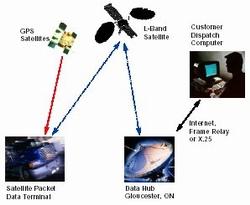Sun, May 16, 2010
Sky Connect Flight-Following Equipment One Key To Battling
Wildfires More Effectively
 Flight-following technology from EMS Aviation shared the
spotlight with California Governor Arnold Schwarzenegger May 3, as
he watched a real-time demonstration of the state’s new
aircraft tracking system technology. The governor also signed an
Executive Order mobilizing the California Department of Forestry
and Fire Protection (CAL FIRE) to be prepared and vigilant as the
state approaches peak fire season.
Flight-following technology from EMS Aviation shared the
spotlight with California Governor Arnold Schwarzenegger May 3, as
he watched a real-time demonstration of the state’s new
aircraft tracking system technology. The governor also signed an
Executive Order mobilizing the California Department of Forestry
and Fire Protection (CAL FIRE) to be prepared and vigilant as the
state approaches peak fire season.
EMS Aviation said in a news release Thursday that it has
delivered 20 of 66 Automatic Flight-Following (AFF) systems to CAL
FIRE, and 17 systems are in operation. CAL FIRE plans to equip its
fleet of 53 fixed-wing and rotary-wing aircraft with AFF systems by
June, according to Chief Del Walters, CAL FIRE director. EMS
Aviation is the world’s leading provider of Iridium-based
voice and tracking systems for aircraft.
The governor told an assembled crowd that equipping the CAL FIRE
fleet with flight-following technology is one way the state will
maximize its firefighting capabilities. “We need every tool
at our disposal. This year, for the first time, we will employ
special GPS technology to track aircraft for more rapid and
efficient response to wildfires,” he said. “We will not
be caught off-guard or under-equipped.”

Walters agreed that the EMS Aviation systems help CAL FIRE
deploy its firefighting aircraft more efficiently. “Not only
will we know where the aircraft are, we’ll know where they
are in relation to an emerging incident, so we’ll know the
fastest tool to dispatch.” On average, CAL FIRE responds to
5,000 wildfires a year. Last year the agency responded to 7,000
incidents.
“We believe having the latest in tracking technology will
be increasingly important as states like California see intensified
and extended fire-fighting seasons. We hope to build on this
strategic relationship with CAL FIRE to showcase how real-time
position-reporting can help other states and countries manage their
fire-fighting resources effectively,” said Nim Evatt, vice
president and general manager of EMS Aviation.
When an aircraft is equipped with AFF, dispatchers are regularly
updated on its position and flight status with no active pilot
input. Reporting intervals are generally every two minutes but may
be customized based on operator preference. Flight data is also
recorded, and the information collected is instrumental in case of
an accident or incident. Aircraft must be equipped with AFF in
order to be considered for government contracts in the U.S. and
Canada.
More News
From 2023 (YouTube Edition): "Ain’t Your Daddy’s Super Cub”—Don Wade Co-owned by Don and Ron Wade—the former of Don’s Dream Machines, a storied >[...]
Pilot-Rated Passenger Reported That The Pilot Did Not Adequately “Round Out” The Landing Flare And The Airplane Bounced And Yawed To The Right Analysis: The pilot state>[...]
Dead Reckoning Dead reckoning, as applied to flying, is the navigation of an airplane solely by means of computations based on airspeed, course, heading, wind direction, and speed,>[...]
Aero Linx: Lake Amphibian Club This website is created and sponsored by the Lake Amphibian Club, to help spread the word about these wonderful, versatile amphibians that can land j>[...]
“I am deeply honored to be sworn in as NASA administrator. NASA’s mission is as imperative and urgent as ever — to push the boundaries of human exploration, ignit>[...]
 Classic Aero-TV: In Praise of Alabamas Patriot Aircraft USA
Classic Aero-TV: In Praise of Alabamas Patriot Aircraft USA NTSB Final Report: Cirrus Design Corp SR22
NTSB Final Report: Cirrus Design Corp SR22 ANN's Daily Aero-Term (12.21.25): Dead Reckoning
ANN's Daily Aero-Term (12.21.25): Dead Reckoning ANN's Daily Aero-Linx (12.21.25)
ANN's Daily Aero-Linx (12.21.25) Aero-News: Quote of the Day (12.21.25)
Aero-News: Quote of the Day (12.21.25)




